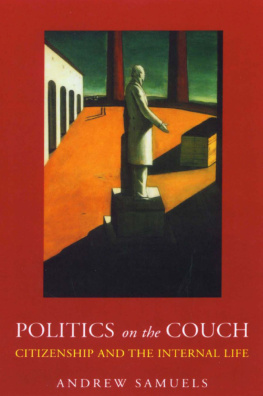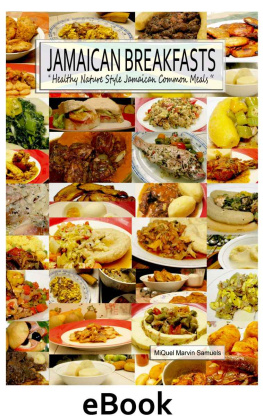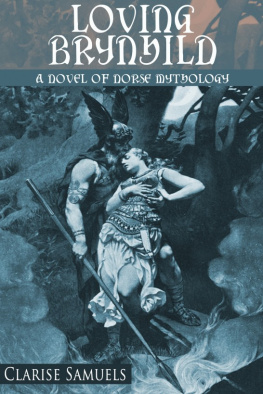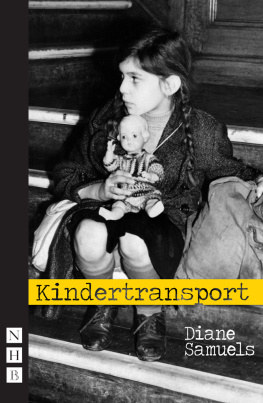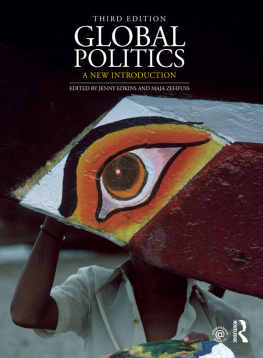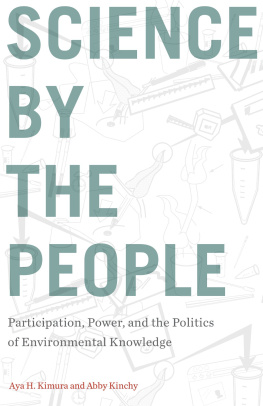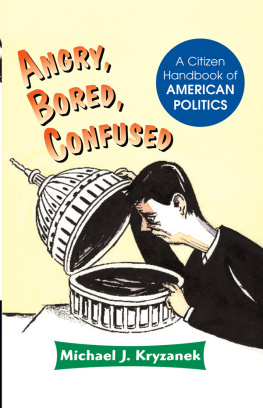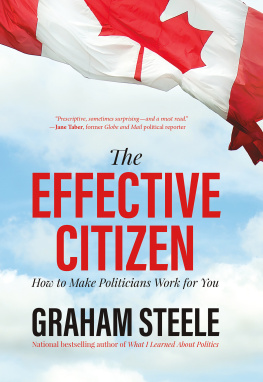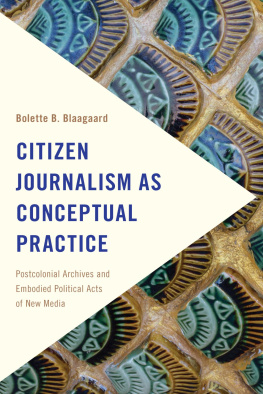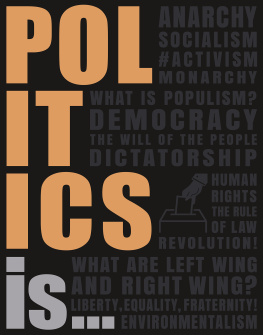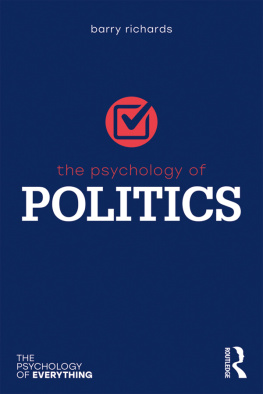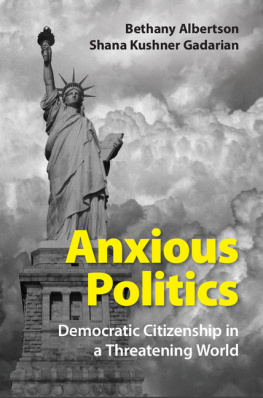POLITICS ON THE COUCH
Andrew Samuels is Professor of Analytical Psychology at the University of Essex and Visiting Professor of Psychoanalytic Studies at Goldsmiths College, University of London. He is a Training Analyst of the Society of Analytical Psychology and a Scientific Associate of the American Academy of Psychoanalysis. In addition to his London-based private practice in psychotherapy, he also works internationally as a political consultant. He is joint founder of Psychotherapists and Counsellors for Social Responsibility and of Antidote, the psychotherapy-based think tank. His previous books have been translated into eighteen languages. They include Jung and the Post-Jungians; A Critical Dictionary of Jungian Analysis (with Bani Shorter and Fred Plaut); The Father; The Plural Psyche; Psychopathology and The Political Psyche.
Also by Andrew Samuels
Jung and the Post-Jungians
The Plural Psyche: Personality, Morality and the Father
The Political Psyche
A Critical Dictionary ofjungian Analysis
(with Bani Shorter and Fred Plaut)
The Father (ed.)
Psychopathology (ed.)
First published in the United States in 2001 by
Other Press
First published in Great Britain in 2001 by
Profile Books Ltd
www.profilebooks.co.uk
10 9 8 7 6 5 4 3 2 1
Copyright Andrew Samuels, 2001
All rights reserved, including the right to reproduce this book, or parts thereof, in any form, without written permission from Other Press, LLC except in the case of brief quotations in reviews for inclusion in a magazine, newspaper, or broadcast.
Printed and bound in Great Britain by Biddies Ltd on acid-free paper.
For information write to Other Press, LLC, 377W. nth Street, New York, NY 10014.
Or visit our website: www.otherpress.com.
Library of Congress Cataloging-in-Publication Data
CIP data for this book is available from the Library of Congress.
ISBN 978-1-85575-347-1
For my clients
Everything starts in mysticism and ends in politics. Charles Peguy

Preface
I N A sense, Politics on the Couch is the final volume of a trilogy that began with The Plural Psyche (1989) and continued with The Political Psyche (1993). Though this book is an extension of the attempts made in the previous two to map the links between our inner and outer worlds, between the seemingly opposite realms of psychotherapy and politics, it is also at times an argument with its predecessors. Much in it has been stimulated by reactions to the ideas I offered previously.
Politics on the Couch is the most ambitious of the three volumes in that it represents my attempt to work out a new language in which the goals of the other two could have been expressed had I had the words at my disposal.
Like all writers, I have been wondering about how the book will be read. Will it be read as a text written by a professor or by a psychotherapist? These two roles have very different approaches to truth and the relative weight given by each to the emotions and their bearing on personal conduct is also different. For the therapist, the acid test is how an individual experiences things'inside, how he or she dreams, relates and behaves in the personal realm. For the academic, while these may be important matters, the overall emphasis is - well, academic.
Will the book be seen as written by a person who is primarily a therapist or by a citizen who just happens to be a therapist? Sometimes people say to me, Well, that's very interesting and useful but you don't really need to be a therapist to say something like that. Shouldn't you have a special therapy perspective on these matters? Others say, Well, I'm sure professional therapists and analysts will be interested in your ideas, but what practical political use will they have? I have become practised at dealing with such responses, for example, on several occasions when organizing and speaking at fringe meetings at Labour Party conferences in the 1990s. Sometimes, I have heard both responses to the same talk.
Part of the problem is that psychotherapy and its ways of thinking are not greatly respected, or welcomed into public conversations. Therapists are often seen as lacking a sense of the real world and therefore as having no credibility. Yet the politicians and commentators who hold sway have not done such a great job of defining or running our political culture that they can afford to reject new approaches out-of-hand.
And will this book be read as a Jungian text? In The Political Psyche, having attempted to assess Jung's anti-Semitism, I made the suggestion that contemporary Jungian analysts make reparation for what Jung said and did. The suggestion has been taken up by many colleagues and, together, we have looked at the whole spectrum of Jung's theories to see if they need modifying or throwing away. Having subjected Jung's ideas about culture and the psyche to a critical analysis, I now feel free to incorporate those that I do feel are relevant and useful.
As far as my professional identity is concerned, however, I would prefer to be thought of as a psychotherapist with a post-Jungian training and background. In psychoanalytic circles, and in the intellectual world generally, to be tagged Jungian still carries a certain taint and leads people to regard one's work as suspect. So let me say it plainly: this is not a Jungian book and should not be read as such. It should be judged on its own merits. Or, to paraphrase a sentence often found in prefaces, any errors in this book are mine and not C. G. Jung's.
Finally, the experiential basis for this book lies in my involvement with a number of political organizations and recent political developments. I have carried out consultations and conducted workshops with politicians, political organizations, activist groups and members of the public in Britain, the United States, Brazil, Israel and South Africa designed to explore how useful and effective perspectives derived from psychotherapy might be in the formation of policy, in new ways of thinking about the political process and in the resolution of conflict. It is difficult to present therapeutic thinking about politics so that mainstream politicians - for example, a Democratic senator or a Labour Party committee - will take it seriously. And the problem is not much reduced when the politicians and organizations are alternative. But it can be done. From time to time, in Politics on the Couch, what I have experienced, witnessed and discovered in these workshops and consultations provides an experiential foundation for my arguments.
I have also been involved in the formation of three organizations engaged in some of the activities discussed in this book. Psychotherapists and Counsellors for Social Responsibility is an organization intended to help therapists and counsellors use their knowledge and experience to intervene as professionals in social and political matters. The second organization is Antidote, a psychotherapy-based think-tank. It fosters multidisciplinary work, and links are sought with people working in fields other than psychotherapy. Antidote has undertaken research work into psychological attitudes to money and economic issues and is also involved in trying to apply ideas about emotional literacy to politics.
The third organization was the St James's Alliance (which no longer exists). Based at a church in central London, it consisted of individuals from diverse fields such as politics, economics, ethics, religion, non-governmental organizations, the media and psychotherapy. It attempted to incorporate ethical, spiritual and psychological concerns into the British political agenda and facilitate a dialogue between non-governmental organizations, single issue groups and activist organizations. It was an experiment in gathering and using political energy that is normally split up and dissipated.

